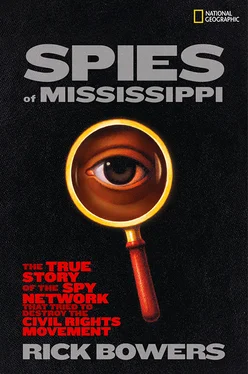The Commission surrounded Henry with black informants, who infiltrated his meetings and intercepted his documents. One report noted that an informant code-named J1 “advised that he had been listening very closely in his church,” and it appeared that NAACP meetings were “not well attended” and that Henry was not “doing very well with his drugstore.” But Henry kept holding meetings, signing up members, registering voters, and speaking out in the press. NAACP membership and black voter registration in the region crept upward.
Then, late in 1958, Henry was elected president of the Mississippi branch of the NAACP, thus becoming one of the most important civil rights leaders in the state. He forged alliances with multiple civil rights organizations, developed relationships with federal authorities, and made friends with sympathetic journalists.
Despite the recognition and the stature, his struggle was really just beginning. After the mayor and Chamber of Commerce of Clarksdale moved to ban blacks from participating in the 1961 Christmas parade, Henry launched a boycott of white-owned businesses, with the slogan, “If we can’t parade downtown, we won’t trade downtown.” The boycott triggered an unprecedented three-year reign of terror against the black community. During that time, Henry’s wife was fired from her teaching job, his drugstore was firebombed, his house was torched, and he was arrested and jailed on false charges. As punishment, he was tied to the back of a garbage truck and forced to load trash in full view of his neighbors. But the attempt to humiliate him backfired on his tormentors. The sight of an unrelenting freedom worker tethered to a trash truck only enhanced his stature in the black community.
Clyde Kennard climbed into his 1958 Mercury station wagon and drove from the black farming hamlet of Eatonville to the stately, all-white campus of Mississippi Southern College.The pristine campus, with its redbrick walkways, white-columned buildings, and shimmering lily ponds, seemed a world away from the family poultry farm that he was running for his ailing mother.
The former U.S. Army paratrooper and University of Chicago political science major was headed to the office of Mississippi Southern president W. D. McCain to get word on his application to enroll at the college. The 30-year-old Kennard was all too aware that he had stirred up a hornet’s nest by applying to an all-white public college, but he had no idea that he was walking into a setup of epic proportions. Commission investigator Zach Van Landingham was waiting for Kennard in President McCain’s office—as was a formal letter of rejection. The police were also watching and waiting with dangerous intentions in mind. The Commission’s role in his undoing would prove that its extraordinary powers were far beyond the point of being contained.
Clyde Kennard was born on June 12, 1927, and raised among the cotton and corn fields of rural Forrest County, Mississippi. At age 12, his family sent him to live with his sister in Chicago so he would have a chance to attend decent schools. In 1945 Kennard enlisted in the army. He graduated from paratrooper school, served as a paratrooper in Korea and Germany, and rose to the rank of sergeant. In 1952, he received an honorable discharge, with the Bronze Star, Korean Service Medal, United Nations Service Medal, and Good Conduct Medal to his credit.
After his discharge, Kennard earned a high school diploma, began taking college courses, and enrolled full-time at the University of Chicago. He completed two years toward a political science degree. Then he got bad news: His stepfather was dying, and his mother couldn’t keep up the farm. In spring 1954, at age 28, Kennard left the University of Chicago for the family chicken farm in Mississippi.
Kennard applied for admission to Mississippi Southern in 1956. His application was denied as incomplete. He reapplied in 1958. It was denied again for alleged irregularities. Then, late in 1959, Kennard applied again. This time he explained his decision—and openly mocked the concept of a segregated society—in an editorial in the Hattiesburg American: “Are we to assume that two sets of hospitals are to be built for two groups of doctors? Are we to build two bridges across the same stream to give equal opportunity to two groups of engineers? Are we to have two courts of law so as to give both groups of lawyers the same chance to demonstrate their skills; two legislatures for our politically inclined; and of course two governors?” Regarding integration and racial cooperation, Kennard concluded, “I would rather meet my God with this creed than with any other yet devised by human society.”
Suddenly, the army veteran, college student, and poultry farmer had captured public attention. The national press jumped on the story of a black military veteran seeking to break the color barrier in higher education in Mississippi. The NAACP offered legal assistance in case Kennard decided to sue the college to gain admission. And the next entry in the Commission’s secret file read in understated fashion, “The Clyde Kennard problem is no longer simply a local concern.”
Конец ознакомительного фрагмента.
Текст предоставлен ООО «ЛитРес».
Прочитайте эту книгу целиком, купив полную легальную версию на ЛитРес.
Безопасно оплатить книгу можно банковской картой Visa, MasterCard, Maestro, со счета мобильного телефона, с платежного терминала, в салоне МТС или Связной, через PayPal, WebMoney, Яндекс.Деньги, QIWI Кошелек, бонусными картами или другим удобным Вам способом.












